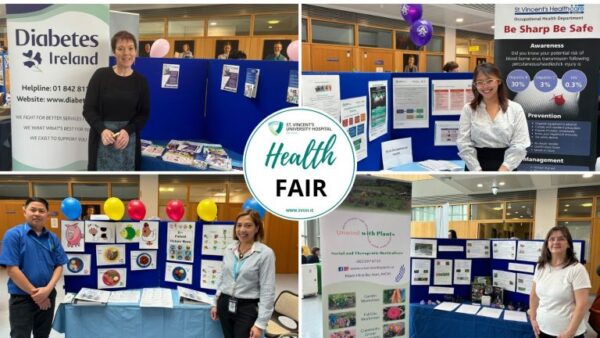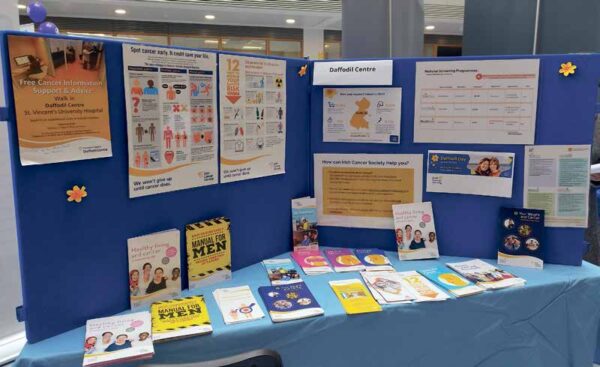By Niamh Byrne
St Vincent’s University Hospital, located in Elm Park, held their annual Health Awareness day in March past from 10 until 2 o’clock upstairs in the premises and NewsFour went along to see what it was all about. People attended from all over the country sharing their health experiences, alongside nurses/doctors who knew all about the illnesses and how to catch them early and also how to cope with the diagnosis. Multiple stands were on display with professionals sharing knowledge of different illnesses and had people speak about their own experience with the illness.

Here are a few I thought could be beneficial for our readers:
Suicide Prevention and Self Harm
This stand aimed to teach people to recognise the signs of suicide. It was very practical and useful as it gave people knowledge of what to do and what not to do in a situation where they are in the company of someone who is expressing suicidal ideation, whether it be a loved one or a stranger on the street. The advice was to really listen to someone when they’re talking about how they feel and, if you’re concerned, gently advise them to talk to a professional and seek help. This programme offers a half day of suicide prevention knowledge, is completely free and is funded by the HSE’s National Office for Suicide Prevention. For more information on training and programmes you can visit www.nosp.ie/training.
A separate stand, but largely covering the same issue, offered services to people who are suffering themselves and need somebody to talk to. Arches Recovery College are service providers, service users and family supporters who together explore and promote mental health recovery in a supportive space. It is a completely free service and is a great opportunity for people who have less money and need some support. They can be contacted via email info@archesrecovery.ie or phone 0873429922.
Irish Kidney Association
The Irish Kidney Association was on hand to give people information on the importance of our kidneys and how to take care of them. Anyone can develop kidney disease, however you are more likely at risk if you: Have diabetes, high blood pressure, long-term use of over the counter medications, are over 50 years old, are obese or have heart disease. The trick is to catch and treat it early. Speaking to a young girl who herself had suffered with kidney disease and ended up having to get a kidney removed, she told us that she put down her tiredness to having recently started college that week. She developed Type 1 diabetes from a case of chicken pox which led to her developing kidney disease. Her symptoms were swollen ankles and tiredness. The importance of knowing your body and feeling that something is not right is so important, she tells us. Approximately 226,000 people suffer from the disease in Ireland with 98% unaware they suffered from it. All it takes is a quick blood and urine sample to check your kidney health and put your mind at ease.
Irish Heart Foundation

Some factors for heart disease like age and gender can’t be changed. However, 80% of premature heart disease and stroke is preventable. Some lifestyle changes include healthy eating, being physically active, not smoking and limiting your intake of alcohol. Every small step you take adds up and will also lower your risk of developing other diseases such as cancers and diabetes. One-in-four men die from heart disease and stroke. We all know how stubborn men can be with their health, however, there is now a number you can call if you’re looking for advice on your health but don’t yet want to see a doctor. A nurse will be on the other end of the line to advise you on what to do from there. The number is 01 668 5001. After all, it could save a life.
Irish Skin Foundation
The Irish Skin Foundation had a stall with people on hand to speak about the importance of keeping safe in the sun and to watch out for any abnormal body moles/lumps. Be alert for any new or changing moles they told us, or the change in appearance of an existing mole. Melanoma is a type of cancer that arises in the pigment producing skin cells called Melanocytes. Melanocytes produce a pigment called melanin that gives skin, eyes and hair their colour but also defends skin cells from UV rays.
Melanomas can appear on normal looking skin as a new growth that continues to change, or come from a pre-existing mole which will grow or change in appearance. Melanomas can appear anywhere on the body including parts that are covered which is why they advise you to check yourself once a month. Doing this you should check your head, face and neck, your front from your chest right down to your lower body, front and back, also your arms and underarms, both sides of your hands including your fingernails, and the soles of your feet and in between your toes.
Living in Ireland unfortunately we don’t get a lot of sun, but it is important to know for occasions like holidays. It is also important to keep your vitamin D levels up during the winter months and we are advised to take a vitamin D supplement daily to avoid brittle bones.
The Health Fair was overall a successful day, spreading knowledge and awareness to all types of people from around the country, including myself and was a humbling way to meet new people. Gratitude to the staff of St Vincent’s, and all concerned, for putting on such a beneficial, and potentially life-saving, exhibition.



